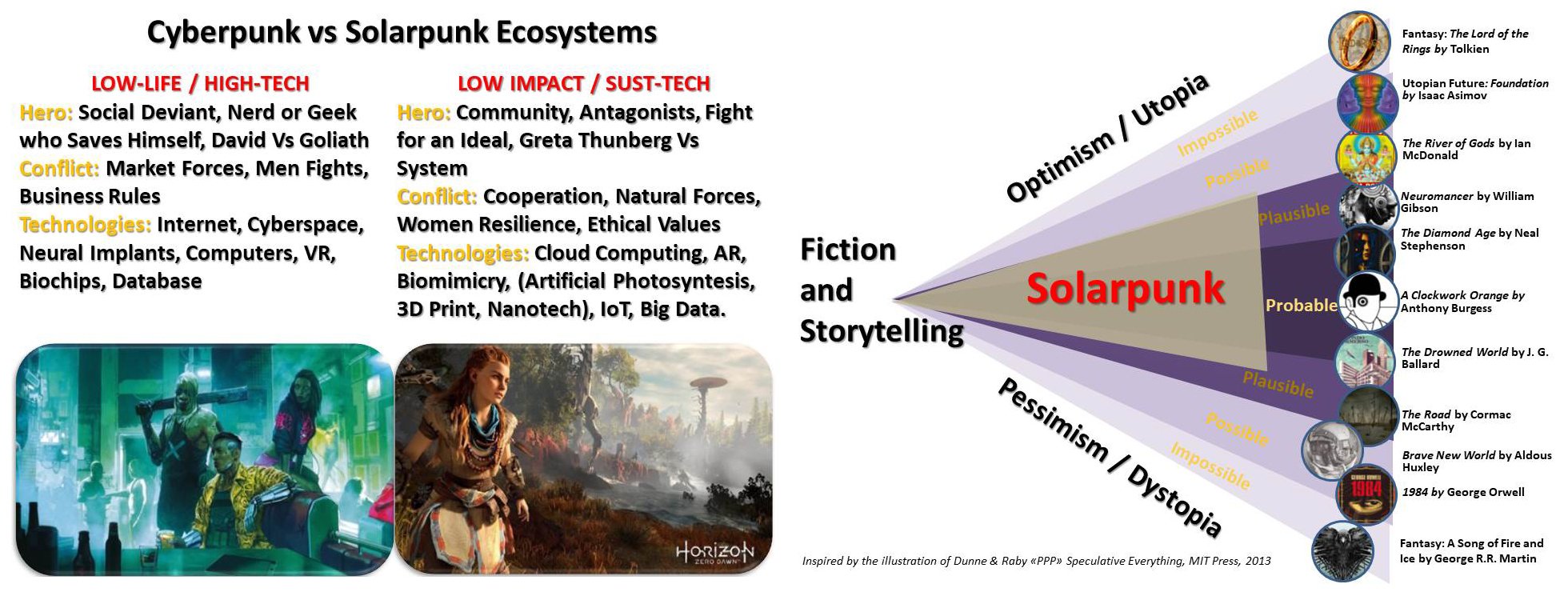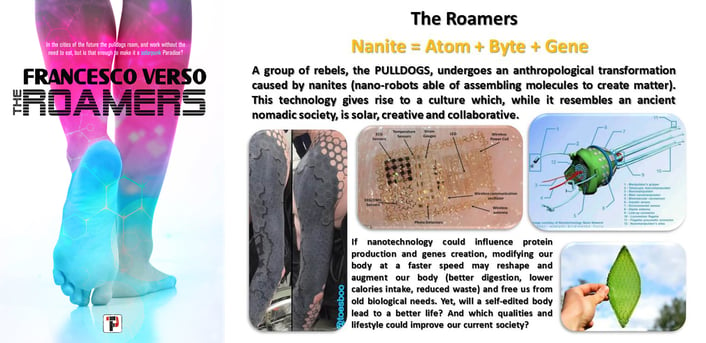A new vision for a sustainable, tech-savvy way of living.
Join us for the book launch of The Roamers by Francesco Verso at Eastercon on Saturday, April 8th at 1:30pm in the Pavilion! Don't miss Francesco's captivating presentation on the Solarpunk concepts that inspired this thrilling new novel. You can read all about the fascinating background of Solarpunk below.

Solarpunk is an international movement born around the first decade of the New Millennium. It promotes a glocalised (see note below), tech-savvy and ecological way of life. The focus of Solarpunk is in both the everyday political practice and the experimentation of alternative and long-term ecologically sustainable technologies to address the threats posed to humanity by turbo-capitalism (see notes below) and one-way globalization. As such, it is not about “hope for a better future” (hope being a force that depends on external elements, while Solarpunk advocates autonomy and independence) and it is not about an “utopian society” (a utopia being like the Sun, you can aim at it but you cannot touch it).

Solarpunk as a Diagnostic Tool
So Solarpunk challenges the rigidity of mainstream narratives that describe the present being caught between the infinite growth of capitalism and the apocalyptic catastrophe of its detractors. Solarpunk is more like a toolbox of practical and perfectible exit strategies from the current never-ending dystopia of late-capitalism. It offers a new alternative to prevailing assumptions about humanity and progress: Anthropocene (see note below), which is built on the assumption that humans are a destructive species and must be treated like a problem (and rarely like a solution), and “Capitalocene”, a short-sighted economic system of appropriating apparently “free” natural resources and/or exploiting human behavior to extract value, see note below) which has produced 300 years of rapidly accelerating and accumulating environmental events with continuous social destruction through colonization, imperialism, and more recently globalization of goods, but not of rights nor of people. With its origins in contemporary Science Fiction and radical environmentalism, Solarpunk promotes decentralized infrastructure, grassroots community engagement, and an independent attitude: more cooperation and less competition, more inclusivity and less exclusivity, more native innovation and less centralized, industrialized automation and global distribution, more cultural appreciation and less cultural appropriation and more sober de-growth and less fake sustainability (green-washing).
The 5 D’s of Solarpunk
The 5 Ds of Solarpunk could be summarized as De-carbonize, De-capitalize, De-centralize, De-patriarchize, and De-colonize the future! Whether this is in the form of a Science Fiction narrative, technological innovation, a civil movement, or a political party, Solarpunk is the toolbox with which to build a better tomorrow.

About the Book: The Roamers
(Publication Date: 9th May 2023) HC, PB and eBook.
The pulldogs, a group of people at the twilight of Western civilisation, undergo an anthropological transformation caused by the dissemination of nanites (nanorobots capable of assembling molecules to create matter). This technology changes the way they eat and gives rise to a culture which, while reminiscent of an ancient nomadic society, is creative and new. Liberation from the imperative of food, combined with the ability to 3D print objects and use cloud computing, makes it possible for the pulldogs to make a choice that seems impossible and anachronistic – a new life, but is it really a paradise?
 About the Author: Francesco Verso
About the Author: Francesco Verso
A multiple-award Science Fiction writer and editor. He has published: e-Doll, Futurespotting and I camminatori. Nexhuman and Bloodbusters have been published in Italy, US, UK and China. He works as editor of Future Fiction, scouting the best SF in translation from around the world. He’s the Honorary Director of the Fishing Fortress SF Academy of Chongqing and the Creative Director of Future Wave, a literary agency based in Beijing.
Glossary of Terms
Glocalization is a term that refers to the process of adapting a global product or service to the local market. It is a combination of the words "global" and "local," and it reflects the fact that businesses need to be able to operate in a globalized world while still meeting the needs of local customers.There are a number of reasons why businesses need to glocalize their products or services. First, the global market is becoming increasingly competitive, and businesses need to find ways to differentiate themselves from their competitors. Second, local customers have different needs and preferences, and businesses need to adapt their products or services to meet those needs. Third, the global economy is becoming increasingly interconnected, and businesses need to be able to operate in multiple countries.
There are a number of ways that businesses can glocalize their products or services. Some common methods include:
- Localizing the product or service: This means adapting the product or service to meet the specific needs of the local market. For example, a company might need to change the packaging of its product to reflect the local culture.
- Localizing the marketing: This means adapting the marketing of the product or service to meet the local market. For example, a company might need to use different advertising methods in different countries.
- Localizing the service: This means adapting the service that is provided with the product or service to meet the local market. For example, a company might need to provide customer service in different languages.
Glocalization is a complex process, and there is no one-size-fits-all approach. However, it is an essential part of doing business in a globalized world.
Turbo-capitalism is a term used to describe a form of capitalism that is characterized by rapid economic growth, globalization, and deregulation. It is often seen as a more extreme form of capitalism than traditional capitalism, and is associated with a number of negative consequences, such as inequality, environmental degradation, and social unrest.
The term turbo-capitalism was first used by Edward Luttwak in his 1998 book "Turbo-Capitalism: Winners and Losers in the Global Economy". Luttwak argued that turbo-capitalism is a new form of capitalism that emerged in the late 20th century, and that it is characterized by a number of features that distinguish it from traditional capitalism. These features include:
- Rapid economic growth: Turbo-capitalism is characterized by rapid economic growth, which is driven by technological innovation, globalization, and deregulation.
- Globalization: Turbo-capitalism is a globalized system, with businesses operating in multiple countries and with goods and services being traded freely around the world.
- Deregulation: Turbo-capitalism is characterized by deregulation, which means that there is less government regulation of businesses and the economy.
Luttwak argued that turbo-capitalism has a number of negative consequences, including:
- Inequality: Turbo-capitalism has led to a growing inequality gap, with the rich getting richer and the poor getting poorer.
- Environmental degradation: Turbo-capitalism has led to environmental degradation, as businesses seek to maximize profits by exploiting natural resources.
- Social unrest: Turbo-capitalism has led to social unrest, as people become frustrated with the growing inequality and environmental degradation.
Luttwak's book was widely read and discussed, and the term turbo-capitalism has since become widely used to describe the current form of capitalism.
The Anthropocene is a proposed geological epoch dating from the commencement of significant human impact on Earth's geology and ecosystems, including, but not limited to, anthropogenic climate change.
The Anthropocene is a relatively new concept, and there is no official definition of when it began. However, many scientists believe that it began in the mid-20th century, when humans began to have a significant impact on the planet's climate and ecosystems.
The Anthropocene is characterized by a number of changes, including:
- Increased greenhouse gas emissions, which are causing global warming
- Changes in land use, such as deforestation and urbanization
- Ocean acidification
- Declines in biodiversity
These changes are having a profound impact on the Earth's environment, and are likely to continue to do so in the future.
The Anthropocene is a time of great challenge, but also of great opportunity. It is a time when we must work together to find ways to live sustainably on our planet.
The Capitalocene is a term used to describe the current geological epoch, which is characterized by the dominance of capitalism. It is argued that capitalism has had a profound impact on the Earth's environment, and that the current climate crisis is a direct result of this system.
The Capitalocene was first proposed by Jason W. Moore in 2016. Moore argues that the Anthropocene is a misleading term, as it implies that humans are the only species that has had a significant impact on the Earth's environment. He argues that capitalism has been the dominant force shaping the Earth's environment for centuries, and that it is the root cause of the current climate crisis.
Moore defines the Capitalocene as a system of power, profit, and re/production in the web of life. He argues that capitalism is a system that is based on the exploitation of nature and the labor of humans. He argues that this system has led to the destruction of ecosystems, the extinction of species, and the degradation of the environment.
The Capitalocene is a term that is still being debated by academics and activists. However, it is a term that is increasingly being used to describe the current state of the Earth's environment, and the challenges that we face in the years to come.



